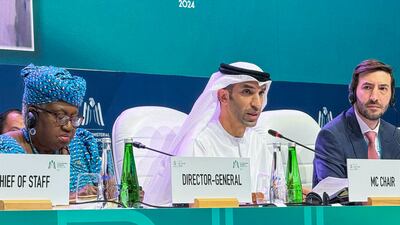World Trade Organisation member countries meeting in Abu Dhabi have agreed to the extension of a moratorium on e-commerce tariffs for another two years amid efforts to support the growth of trade globally.
They also agreed to speed up discussions on dispute settlement reforms at the trade body, according to a WTO document released late on Friday.
“We agree to maintain the current practice of not imposing customs duties on electronic transmissions until the 14th Session of the Ministerial Conference [in 2026],” the document reads.
“The moratorium and the Work Programme will expire on that date.”
Since 1998, WTO members have periodically agreed to extend the moratorium, with the last extension agreed on in June 2022 during the body's 12th ministerial conference.
The moratorium was due to lapse during the current conference but member countries decided to extend it.
On dispute settlement reform, the WTO said it would accelerate discussions in an inclusive and transparent manner, “build on the progress already made, and work on unresolved issues, including issues regarding appeal/review and accessibility to achieve the objective by 2024".
Thousands of delegates from more than 160 member countries took part in the biennial conference.
They focused on reaching an agreement on some of the key issues affecting global trade, including the reform of the WTO’s dispute resolution system, an extension of a ban on e-commerce tariffs and reduced subsidies on fisheries and agriculture.
The meeting was supposed to have ended on Thursday but was extended to Friday to give member countries more time to iron out differences and reach an agreement on issues affecting global trade.
“We convened MC 13 against an international backdrop marked by greater uncertainty than at any time I can remember, during the long hours of negotiation here we saw moments of difficult but rewarding co-operation,” the WTO’s director general Ngozi Okonjo-Iweala said during the closing session of the conference.
“On the e-commerce moratorium, we've managed to reach a consensus. In the second wave of fishery subsidies negotiations, we narrowed some outstanding gaps, but several more remain.”
After the WTO struck an agreement in 2022 to ban subsidies contributing to illegal, undeclared and unregulated fishing, the Abu Dhabi conference focused on a second deal to reduce subsidies that drive overcapacity and overfishing.
“I had hoped that we could finish these negotiations in Abu Dhabi … have prepared the ground for his conclusion,” Ms Okonjo-Iweala continued.
“Moving out from here, this is good because the livelihoods of 260 million people who depend directly or indirectly on marine fisheries are at stake. We should capitalise on the progress here to reach a meaningful outcome.”
She also said the WTO remains a source of “stability and resilience in an economic and geopolitical landscape fraught with uncertainties and exogenous shocks”.
The 13th WTO Ministerial Conference took place against the backdrop of trade headwinds as Yemen's Houthi rebels continue to attack ships in the Red Sea, which connects Europe with Asia, while global economic growth has slowed amid higher interest rates and geopolitical tension.
Global trade is expected to miss its growth forecast for 2024 as downside risks continue to persist.
On October 5, the WTO forecast a 3.3 per cent growth in global trade for 2024 – a strong improvement on last year's 0.8 per cent – but the projection was made before the Israel-Gaza war that began two days later.
“The Red Sea crisis and Panama Canal drought are new sources of delays and inflationary pressure, offering timely reminders of risks posed to global trade and climate change,” Ms Okonjo-Iweala told the ministerial conference on Monday.
India, along with other countries such as China and Indonesia, is opposing moves to curb fishery subsidies to protect the local fishing community.
The world’s fifth-largest economy is also against extending the existing moratorium on e-commerce tariffs as it looks to raise revenue and support domestic industries.
However, India supported the extension of the ban on e-commerce tariffs in “solidarity with the UAE and good relationships”, as the Gulf country is hosting the conference, India’s Minister of Commerce and Industry Piyush Goyal told media in an informal chat.
One of the major outcomes during the meeting had been the formal accession of two new members to the Geneva-based body – East Timor and Comoros.
The UAE also announced a $10 million grant to support several crucial WTO initiatives, including the Fisheries Funding Mechanism, the Enhanced Integrated Framework and the Women Exporters in the Digital Economy Fund.
International co-operation “is not only the best but often the only way to address the challenges that affect global trade”, said Dr Thani Al Zeyoudi, UAE Minister of State for Foreign Trade and the conference chairman.
“Delivering the Abu Dhabi package of outcomes is a true testament to the value that members continue to attach to the organisation.”
Appellate body at WTO
Dr Al Zeyoudi also said heavy participation and engagement of the US in the meeting “is a positive sign reconfirming their commitments regarding the appellate body to be sorted out this year is another commitment”.
Countries including India have been demanding the restoration of the appellate body at the WTO to resolve trade disputes.
The WTO is seeking to push a package of reforms to improve its trade dispute settlement system and overcome a four-year impasse on the appointment of new judges.
Its court has not functioned since the US opposed a new judge appointment, leaving disputes worth billions of dollars unresolved.
Dr Al Zeyoudi also said the member countries had “excellent deliberation” on some of the topics including agriculture and managed to bring a text which under negotiation but due to lack of time, they could not move ahead.
“Fisheries as well. We were about to have a deal and again, it's about timing,” he said.
Ms Okonjo-Iweala added during a media briefing following the conclusion of the conference: “We didn't achieve all we wanted to, but what we achieved I think was pretty amazing.”


